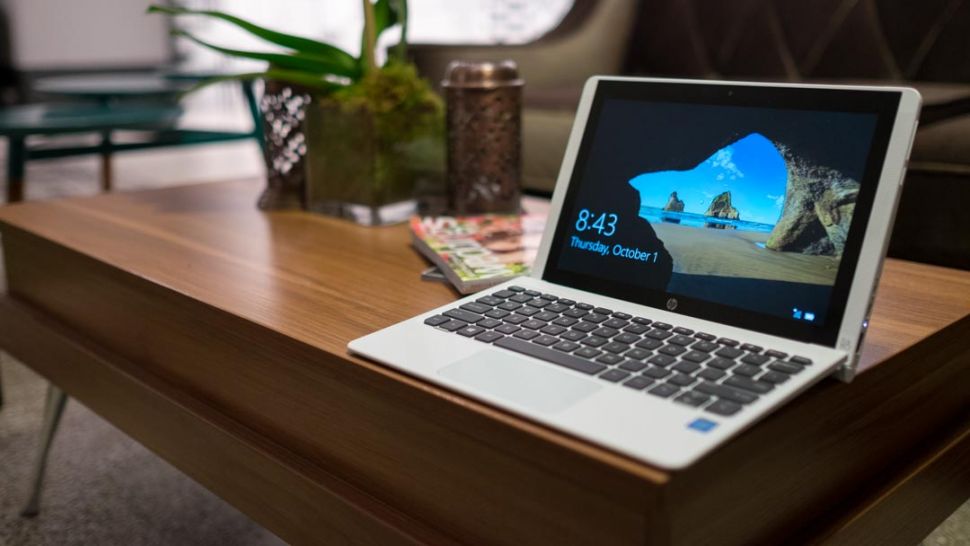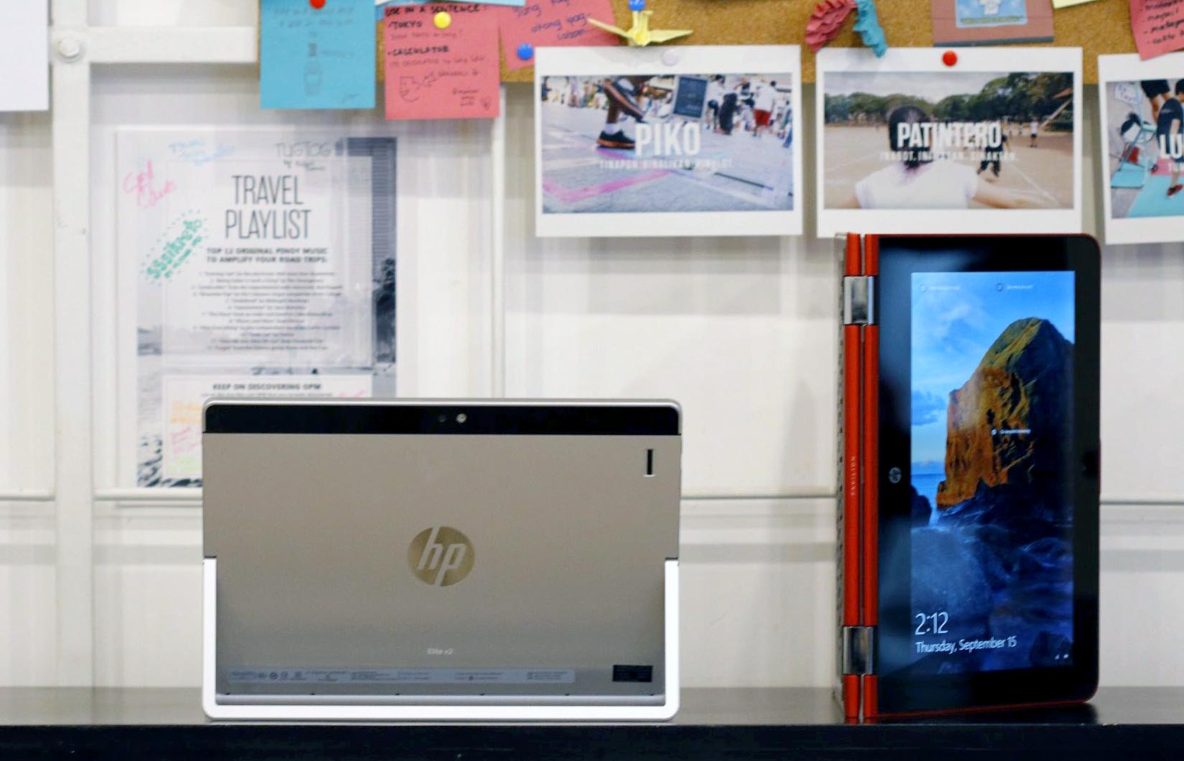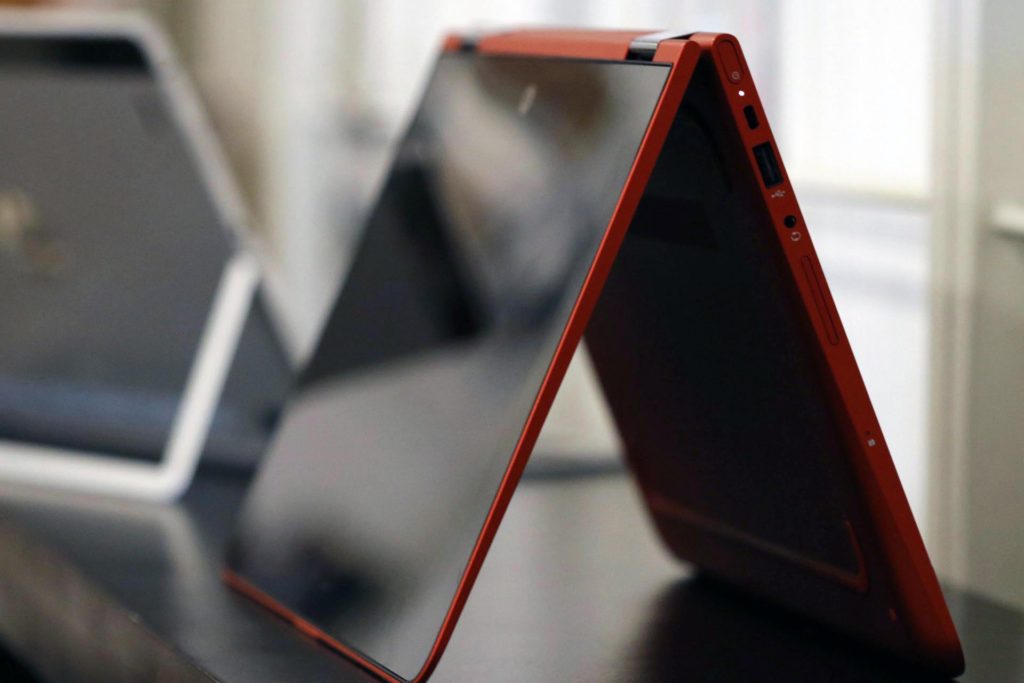We’re of course referring to 2-in-1 devices, which the company hopes will bolster its “number four” ranking in the consumer space among local PC brands. To that end, HP has introduced updated models of its 2-in-1 lineup, including the HP Pavilion x360 and x2. Both are laptop-first, tablet-second machines that are priced low enough to entice the average consumer.
HP Pavilion x360
The HP Pavilion x360 doesn’t look different from the standard laptop. It has the right thickness and heft; the lid can fit either an 11- or 13-inch display, and the bottom half houses the internals, plus a full-size keyboard and trackpad.
But it also has a pair of metal hinges that lets you flip the touchscreen 360 degrees — hence the “360” suffix — behind the keyboard, resulting in a rather unwieldy tablet.
The keyboard automatically turns off and the Windows 10 user interface switches to tablet mode when the screen goes all the way back. The device can also be propped up in what HP calls “tent” mode, which folds it enough to rest on a flat surface, ideal for reading recipes and sharing presentations.
The Pavilion x360 starts with an Intel Celeron N3060 processor that can be upgraded to Intel’s Skylake Core i3 CPU paired with 4GB of RAM and 500GB of storage. All configurations ship with Windows 10 preinstalled. HP Philippines tells us the Celeron chip’s efficiency allows for longer battery life, which is crucial for a machine billed as a tablet replacement.

The HP Pavilion x2, via TechRadar
HP Pavilion x2
The smaller Pavilion x2 is built for people who want a cheap Windows 10 convertible for use at home or at the workplace. It eschews the metal enclosure of competing models in favor of a sturdy plastic body in a choice of silver, red, and white finishes.
Unlike the x360, transforming this device from laptop to tablet is pretty straightforward: you yank the display from the keyboard half — that’s all it takes. The Pavilion x2 is held together by strong magnets, and there are no moving parts that are subject to wear. The touchscreen measures 10 inches and has a resolution of 1,280 x 800. Nothing special, but good enough for its intended purpose.
The tablet itself features one USB 2.0 port, one USB Type-C port, a microSD card reader, a headphone/mic jack, and a mini HDMI port for connecting to an external display. Computing tasks are handled by an Intel Atom processor with 2GB of RAM. Storage comes by way of a 32GB eMMC flash storage.
Price and availability
The HP Pavilion x360 starts at P20,990 for the Intel Celeron model and goes all the way to P29,990 for the Core i3 option. The Pavilion x2, meanwhile, is priced at P15,990. Getting it in either red or white will cost you an additional P1,000.
Both convertibles are slated to hit stores in late September. They will also be available on Lazada Philippines, making them accessible to customers in remote locations.
Bucking the PC industry’s slide
HP is the leading brand for business or enterprise-grade PCs in the Philippines, where PC shipments continue to beat market expectations. HP Philippines revealed to us it sold more laptops this quarter than in the same period in 2015, though the exact figures are unavailable at press time. Most of the growth could be attributed to Microsoft’s aggressive push for Windows 10 adoption, we’re told.
Specs of the HP Pavilion x360 (Price: Starts at P20,990)
- 11-inch touch display, up to 13 inches (1,366 x 768 resolution)
- Intel Celeron N3060 CPU, up to Intel Skylake Core i3
- 4GB RAM
- 500GB HDD storageUSB 2.0 port, USB 3.0 port,HDMI port, Ethernet port, SD card reader, headset jack
- Windows 10
Specs of the HP Pavilion x2 (Price: Starts at P15,990)
- 10-inch touch display (1,280 x 800 resolution)
- Intel Atom x5-Z8300 CPU
- 2GB RAM
- 32GB eMMC flash storage
- USB 2.0 port, USB Type-C port,mini HDMI port, microSD card reader, headset jack
- Windows 10
Video you may want to watch
‘The world’s thinnest laptop, the HP Spectre’
Share this Post




